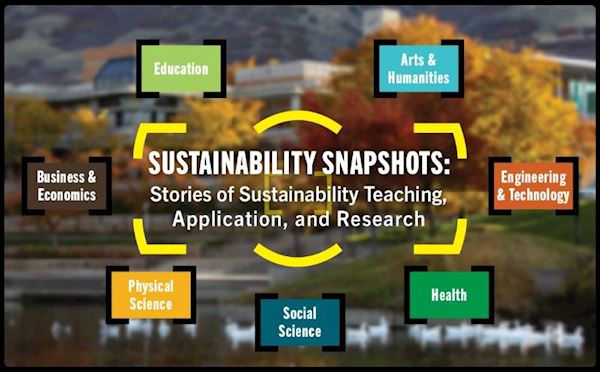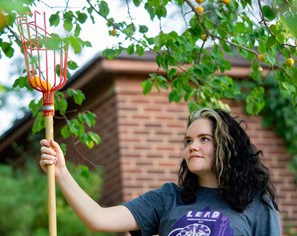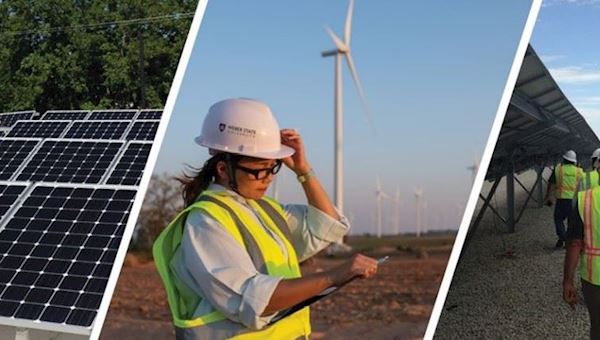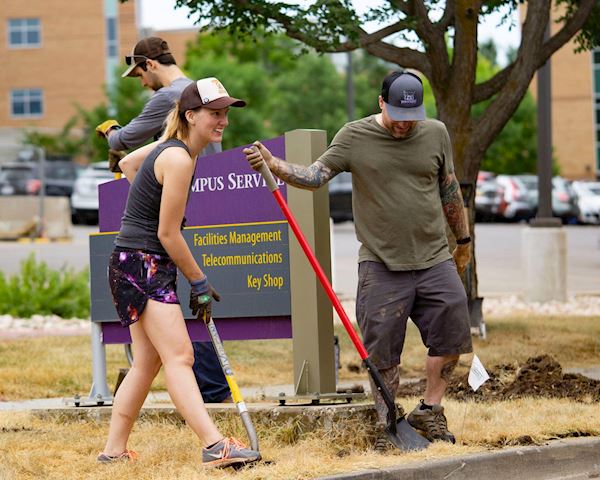
September WSU Sustainability Newsletter
Offset Your Commuting Carbon Footprint and Get Your Contribution Matched by WSU Sustainability 
Weber State University is committed to being carbon neutral by the year 2040. To date, WSU has cut its total carbon footprint by 34% but our emissions associated with students, faculty, and staff commuting to and from the university still remain high and represent 66% of WSU's total footprint!
To be a part of the solution please consider using alternative forms of transportation to get to campus and/or contribute to the purchase of carbon offsets to reduce your impact. A carbon offset is an action or project (such as the planting of trees or carbon sequestration) that compensates for the emission of carbon dioxide or other greenhouse gases to the atmosphere. Offsets are measured in tons of carbon dioxide-equivalent. The average WSU parking pass holder emits over two tons of greenhouse gases annually commuting to and from the university.
When you purchase a parking pass this year please select the “Add Carbon Offset” option to contribute to the carbon offset fund. You can choose to purchase enough offsets to reduce your full annual carbon footprint, you can go the extra mile and offset your emissions and those of another student, or there is an option to contribute what you can. All contributions will be matched by WSU's Energy & Sustainability Office!
If your parking pass purchase is on autorenewal, you have already purchased it, or if you do not purchase a parking pass but would like to help purchase carbon offsets, you can still contribute. Just log into your account at weber.myparkinginfo.com, using your Weber credentials, and then select “Add Carbon Offset” as depicted in the screenshot above.
WSU's Empower Northern Utah Program Offers Free LEDs and Discounted Thermostats
For the last two years, the Empower Northern Utah program has helped over 800 households improve energy efficiency with smart thermostats and LED light bulbs. This resulted in a total cost savings of over $45,000 and a reduction of approximately 350 metric tons of greenhouse gas emissions each year. That is equivalent to avoiding the emissions of nearly 8,000 vehicle miles.
Once again Weber and Davis County residents can get discounted smart thermostats for under $60 (originally $169) and free LED lightbulbs in exchange for old incandescent and CFL bulbs! These energy efficiency upgrades can cut utility costs, clean Utah's air, and reduce fossil fuel emissions.
Residents can bring up to 10 old, inefficient incandescent or CFL bulbs to exchange for new, energy efficient LED bulbs. Bulbs are available on a first come, first served, walk-up basis during the exchange events held on Saturday, September 25 and Saturday, October 2 from 10:30 a.m. to 12:30 p.m. at the Weber County Library Main Branch (2464 Jefferson Ave. Ogden, Utah 84401).
Residents must pre-register for smart thermostats. Registration opens on Tuesday, September 28 at 6:00 p.m. on the weber.edu/empower website and will remain open while supplies last. Successful registrants will receive a link to schedule a time for thermostat pick up on Saturday, October 9.
This program is hosted by Weber State Sustainability in partnership with UCAIR (Utah Clean Air Partnership), Ogden City, the H.E.A.T Program, Utah Clean Energy, and others. Visit weber.edu/empower for more information, or contact Sadie Braddock at sadiebraddock@weber.edu or 801-626-6310
Sustainability Snapshots Fall 2021 Speaker Series 
Come hear stories of sustainability across the curriculum! Understanding and addressing the critical challenges that face us and embracing new opportunities across the intersecting realms of environment, society and economy (such as climate change, water quality and quantity, air pollution) requires expertise, insight, and skills from a wide array of disciplines. This series aims to showcase how many of our award winning faculty from across campus are engaging with sustainability in their teaching, research, and/or through applied projects.
Upcoming sessions - all on Tuesdays, in person at 1:30 p.m.-2:45 p.m., Lindquist Hall 395 (with the exception of Sept 14)*
09/14/2021 - EcoPoetics Presentation and Reading (held outside)
Forrest Gander, American ecopoet, Pulitzer Prize winner, trained in literature and geology, and a Visiting Writer in the Creative Writing Program. Note: this session will be held outdoors on the WEST side of Elizabeth Hall.
09/21/2021 - Accounting for Environmental Sustainability
David Malone, Professor of Accounting, School of Accounting & Taxation, WSU
09/28/2021 – Utah Climate Week Presentation
Toward a Low Carbon Future: Net Zero Housing and Energy Performance, Jeremy Farner, Associate Professor Construction Management, Wadman Center of Excellence Director, Building Design & Construction
Please visit the series’ website for a full list of sessions and any schedule changes.
The series is open for free to all as a drop-in/lunch and learn event. To receive the Zoom link and reminders of the week's topic directly to your inbox, please complete this brief form.
Students may also attend the series for credit with Dr. Alice Mulder Geog 4920 (1-credit), CRN 28125. A key learning outcome for students in this 1 credit course is to see the wide interdisciplinary connections to sustainability and be exposed to what/how different areas approach sustainability topics and challenges. Contact Dr. Mulder to be signed up for the course amulder@weber.edu.
*Sessions may also be attended via Zoom: https://weber.zoom.us/j/91860508462?pwd=eHA1ek1xZVJlUVJOV0dhUU55elpidz09
Faculty – Show Students You Teach Sustainability with the SUS Attribute 
Today’s students are essential to addressing the challenges of our times and this generation of students seems to be well aware of that. With the SUS course attribute faculty indicate that their course or course section addresses sustainability, broadly defined, in some way. A course may focus on a vast array of issues, topics, tools and approaches in the intersecting environmental and social/economic aspects of sustainability. The SUS attribute signals to students that a class includes sustainability-focused learning outcomes.
Formally incorporating sustainability into the classroom offers students context on how to incorporate sustainability into their daily lives, whether at school, work, home or play. Students can find the SUS courses at: https://www.weber.edu/sustainability/courses or by searching for the SUS attribute during registration.
Application deadline for Spring 2022 classes is Friday, October 1. The application process is simple – three steps. The “Why, What, and How” of the attribute and all necessary links to apply can be found here. Successful applicants may retain the SUS attribute on their course/section for five years before renewal. Faculty are invited to participate in drop in help sessions via Zoom on Friday September 17 and Thursday, September 23 from 2-3 p.m. To learn more visit https://www.weber.edu/sustainability/sus-attribute.html or contact the SUS Attribute Committee Chair, Alice Mulder, at amulder@weber.edu for more information.
Students – Get Involved with Weber State’s Sustainable Clubs 
The Environmental Ambassadors, Food Recovery Network, Garden Club, and Citizens’ Climate Lobby are looking to recruit new members to join their respective clubs. Students from all majors are welcome to join. Their kick-off meeting is on Friday, September 17, 2021 at 2:00pm.
The Environmental Ambassadors will host weekly tabling throughout the year to recruit club members as well as promote ongoing events. For the month of September, they will be providing LED light bulbs to anyone who would like to exchange their incandescent or CFL light bulbs to more energy efficient light bulbs free of charge. Visit the clubs’ website to learn more.
Help Weber State go zero-waste by 2040!
Interested in volunteering or need verified service hours? Sign up to volunteer as a Zero-Waste Champion through the Food Recovery Network or new Zero-Waste Athletics program.
The Food Recovery Network is ready to fight food waste and feed people! A key focus is to recover surplus food from dining services, and redistribute it to the Weber Cares Food Pantry and Lantern House. The Network is also partnered with O-Town Kitchen for community gleaning projects to harvest excess fruit from local residents’ trees.
The new Zero-Waste Athletics program is looking for volunteers to assist with recycling education and collection on game days this fall. Bring a friend, enjoy the game, and help us make sports green at Weber State. Volunteers will have the chance to earn free merch and recognition at our end of year Sustainability Awards Celebration!
New Energy Engineering Degree at WSU! 
This fall marks the first time WSU students can officially enroll in the new Energy Engineering Bachelor of Science program offered through the College of Engineering, Applied Science & Technology (EAST). This interdisciplinary degree combines the fields of mechanical engineering, electrical engineering, environmental science, and economics. Energy engineering is the branch of engineering that deals with energy efficiency, power generation, energy services, facility management, environmental compliance, sustainable energy and renewable energy. The main responsibility of energy engineers is to find the most efficient, sustainable and cost-effective ways to operate buildings, power plants and manufacturing processes.
The program prepares graduates to enter the energy engineering industry or to pursue graduate studies in the discipline. The Weber State University Energy Engineering Program will seek accreditation by the Engineering Accreditation Commission (EAC) of ABET upon producing its first graduate. For program information please visit https://www.weber.edu/me/energy-engineering.html.
Water Conservation Efforts Summer 2021 
The ongoing drought has impacted everyone here in Utah. It has stressed campus landscapes just as it has affected residential landscapes. Fortunately, thanks to WSU’s Water Acton Plan WSU has been able to rapidly respond to the drought and reduce watering to meet the state’s recommendations for water use.
If this summer is a preview of what’s to come with climate change in the west, then this year has provided valuable insight into how well the campus’ xeriscape areas can stand up to very low watering and still look good. It has also helped to identify other areas across campus that held up well to drought and those that did not. This information is extremely valuable in planning xeriscape projects for the future and efforts to build greater resiliency into campus landscapes such that they can look beautiful even in extreme drought. One look at grass covered areas around campus reveals that landscape water use has decreased considerably. In fact, WSU has reduced its secondary water consumption by around four million gallons a week! Each zone has been watered twice a week and the landscape crew has been very diligent about fixing brakes and making sure watering is consistent. Thank you to the landscape crew for all their hard work!
Xeriscape areas will continue to expand with at least one project completed each year on campus. The Energy and Sustainability Office (ESO) partners with the landscape crew to pick an area that is low-use, difficult to maintain, and would benefit from being xeriscape. This year the project is near the Heat Plant. Grass is being removed now and will be followed by the installation of drip irrigation, rock, and mulch. The planting will be done next spring, since secondary water will be turning off early this year and the plants would not have time to establish themselves. Future areas for xeriscape will be guided by WSU’s new Xeriscape Master Plan, completed this year. Using this plan WSU not only knows where the next xeriscape project will take place, but the expected water savings and decreased maintenance needs.
Ogden Takes another Step Toward 2030 Renewable Energy Goal 
In 2019, Ogden adopted a resolution for our electric supply to be generated by the equivalent of 100% renewable energy by the year 2030. This summer the Council voted to take the next step in reaching the goal. Ogden is now a participant and decision maker on Utah 100 Communities governance board, along with over a dozen other Utah municipalities.
Each of these communities is eligible to take advantage of the Community Renewable Energy Act (CREA), which was passed by the Utah State Legislature in 2019. The Act allows for municipalities to determine whether the standard energy mix for their communities going forward will be primarily powered by renewable energy, or by fossil fuels.
Those participating in CREA will receive the equivalent of 100% renewable electricity as the municipality’s standard electric supply, which will be provided by Rocky Mountain Power (RMP). Individuals and businesses will be able to opt out when the program is introduced, and stay on RMP’s existing energy mix.
Municipalities who do not participate in CREA will keep the existing RMP mix, which consists mostly of fossil fuels, as their standard. People and businesses in those communities can buy renewable energy credits (REC) through the Blue Sky program. However, the RECs do not bring renewable energy directly on to the RMP grid, nor are they able to insulate customers from potential carbon taxes.
Part of the process of determining if CREA is right for a community is considering underserved and low-income residents. Cities are looking for ways to ensure that these communities will not be overly impacted by rate increases, nor left behind. Though renewable energy costs are falling below those of fossil fuels, building new infrastructure has upfront costs. Traditionally it has been those in higher income brackets who have been able to invest in, and take advantage of renewable energy’s falling costs. The challenge now is to find pathways, which allows everyone to choose the option that best fits their values, and financial situation.
